Lesson 7 Always Have Breakfast
冀教版六年级英语下册Lesson7-Always-Have-Breakfast!

第一次“先学后教”——比认单词
认真跟读单词,掌握单词的准确发音, 并背记单词。 8分钟之后进行检测。
healthy strong once times vegetables fruit
健康的 强壮的 一次 次数 蔬菜 水果
当堂检测:
背写单词
健康的 强壮的 一次 次数 蔬菜 水果
healthy strong once times vegetables fruit
1 How often breakfast ? Danny had
did Danny
have
breakfast
did
once .
have
2 How often breakfast ?
Jenny
Jenny
had breakfast
six
times .
How often 是疑问词,意为“多长时间 一次,多久一次”,用于对频率提问。
第三次“先学后教”——比能力
1、根据提示,按照自己的实际 情况完成“健康卡”。(let‘s do it 第
1部分) 2、根据实际情况完成“健康问答卷” (let's do ti 第2部分) 最后老师提问,学生回答。
1.45 Height: _______m 38 kg Weight:_____ The boy is strong and healthy.
你吃了早餐么?
冀教版 六年级下册
Lesson 7 Always Have Breakfast!
学习目标:
一、掌握本课“四会”单词:health strong once vegetables times fruit 二、熟练使用本课句型:how often did/do .....? 三、能够熟读课文,理解课文意思。
2020冀教版六年级英语下册电子课本课件【全册】

Lesson 2:At the sports shop
2020冀教版六年级英语下册电子课 本课件【全册】
Lesson 3:Let's try!
2020冀教版六年级英语下册电子课 本课件【全册】
Lesson 4:Did you have fun?
Lesson 7:Always have breakfast!
2020冀教版六年级英语下册电子课 本课件【全册】
Lesson 8:Always brush your teeth!
2020冀教版六年级英语下册电子课 本课件【全册】
2020冀教版六年级英语下册电子课 本课件【全册】
Review:Again,please!
2020冀教版六年级英语下册电子课 本课件【全册】
Unit 2:Good to you!
2020冀教版六年级英语下册电子课 本课件【全册】
2020冀教版六年级英语下册电子课 本课件【全册】
Lesson 5:A basketball game
2020冀教版六年级英语下册电子课 本课件【全册】
Lesson 6:A famous football player
2020冀教版六年级英语下册电子 课本课件【全册】目录
0002页 0032页 0071页 0121页 0188页 0218页 0233页 0279页 0306页 0350页 0411页 0436页 0455页 0471页 0497页 0524页 0542页
课文目录与封面 Lesson 1:Ping-pong and basketball Lesson 3:Let's try! Lesson 5:A basketball game Review:Again,please! Lesson 7:Always have breakfast! Lesson 9:Eat more vegetables and fruit! Lesson 11:Work hard! Review:Again,please! Lesson 13:Summer is coming! Lesson 15:Jenny's summer holiday Lesson 17:Danny's summer holiday Review:Again,please! Lesson 19:Buying gifts Lesson 21:A party for Li Ming Lesson 23:Good-bye! Review:Again,please!
冀教2011版六年级英语下册《Lesson7AlwaysHaveBreakfast》教案及教学反思

冀教2011版六年级英语下册《Lesson7AlwaysHaveBreakfast》教案及教学反思教学目标1.学生能够理解单词:always, breakfast, lunch,dinner。
2.学生能够听懂、会说和会读短语:always havebreakfast, have lunch, have dinner。
3.能够掌握以下句式的用法:I always havebreakfast at seven o’clock. She has lunch attwelve o’clock. He has dinner at six o’clock.4.提高学生的英语口语表达能力。
教学重点1.单词及短语的掌握。
2.句式的运用。
教学难点1.句式的构建与表达。
2.口语交流的提升。
教学准备1.教师准备PPT教案。
2.学生课本、练习册、录音笔。
教学过程Step 1. Warm up1.与学生进行简单的英语问答,如问候和问今天的天气等。
2.让学生使用已学过的英语单词及短语进行交流,包括问候及日常用语。
3.检查学生对上节课学习内容的掌握情况。
Step 2. Presentation1.引入新单词及短语:always, breakfast, lunch, dinner, always have breakfast, have lunch, have dinner。
2.用图片展示每个单词的意思及意象。
3.通过朗读单词和让学生跟读巩固单词及短语的掌握。
Step 3. Practice1.学生使用新学单词及短语进行对话和问答,并使用句式I always have breakfast at seven o’clock. She has lunch at twelve o’clock. He has dinner at six o’cl ock.进行练习。
2.通过情景模拟练习,让学生能够自如地运用所学知识。
3.以小组为单位,让学生互相讲述自己的饮食习惯,即早中晚餐的时间和内容。
Lesson_7_Always_Have_Breakfast!
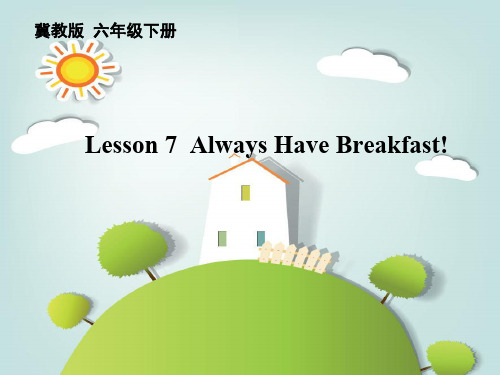
Read and Judge
1.(F ) Danny had breakfast towniccee last week.
2.(F ) Danny had ehgagms,bbureeragderasnd milk for breakfast. 3.( ) Danny had breakfast at 6:15 on Tuesday
3.( ) Danny had breakfast at 6:15 on Tuesday morning.
4.( ) Li Ming has breakfast every day.
one time =once
two times =twice three times four times five times ……. times
Homework
给自己制定一个健康的、科学的一周早餐食谱
Monday Tuesday Wednesday Thursday Friday Saturday Sunday
time what
morning.
4.( ) Li Ming has breakfast every day.
What do you have for breakfast?
Read and Judge
1.(F ) Danny had breakfast towniccee last week.
2.(F ) Danny had ehgagms,bbureeragderasnd milk for breakfast. 3.(F) Danny had breakfast at 67:1350 on Tuesday
冀教版 六年级下册
Lesson 7 Always Have Breakfast!
冀教版英语六年级下册 Lesson 7 Always Have Breakfast 教案
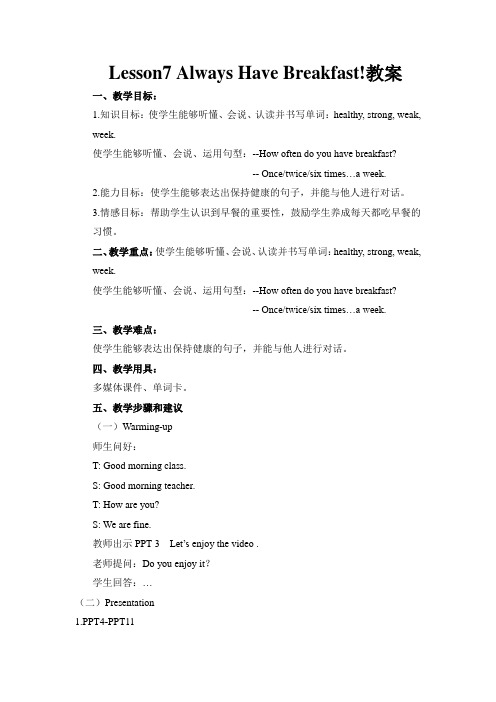
Lesson7 Always Have Breakfast!教案一、教学目标:1.知识目标:使学生能够听懂、会说、认读并书写单词:healthy, strong, weak,week.使学生能够听懂、会说、运用句型:--How often do you have breakfast?-- Once/twice/six times…a week.2.能力目标:使学生能够表达出保持健康的句子,并能与他人进行对话。
3.情感目标:帮助学生认识到早餐的重要性,鼓励学生养成每天都吃早餐的习惯。
二、教学重点:使学生能够听懂、会说、认读并书写单词:healthy, strong, weak,week.使学生能够听懂、会说、运用句型:--How often do you have breakfast?-- Once/twice/six times…a week.三、教学难点:使学生能够表达出保持健康的句子,并能与他人进行对话。
四、教学用具:多媒体课件、单词卡。
五、教学步骤和建议(一)Warming-up师生问好:T: Good morning class.S: Good morning teacher.T: How are you?S: We are fine.教师出示PPT 3 Let’s enjoy the video .老师提问:Do you enjoy it?学生回答:…(二)Presentation1.PPT4-PPT11学习本课的第1部分的内容。
(1)PPT4-5展现课文内容,首先听课文录音,学习课文第一部分.(2) PPT6 Read and answer the questions.① How often did Danny eat breakfast ?② When did Kim have breakfast ?(3) PPT7讲解课文知识点,举例紧跟。
⑴句型:主语+ want/wants to be + 形容词.……想成为……样的。
Unit 2 Lesson 7 Always Have Breakfast!(教案)英语六年级下册

Lesson 7 Always Have Breakfast!一、教材分析本课教学内容是冀教版《学英语》三年级起始版第八册Unit 2:Good Healthy to You中的一节新授课,为本单元的第一课,起到了总领的作用。
在本单元中,Mr Wood、Li Ming、Jenny和Danny介绍了健康的生活方式,包括营养饮食、加强体育锻炼以及努力工作。
内容贴近学生的实际生活,符合学生认知的需要,使他们能够很容易说出怎样做才是最健康的,体现了教材的科学性原则。
本课向同学们介绍了什么是健康以及吃早餐对人们身体的重要性,包含两部分内容。
第一部分主要围绕与健康有关的词汇healthy, strong, 阐明为什么吃早餐,然后通过讨论课文人物Danny和Kim一周内吃早餐的情况学习有关频率的特殊疑问句How often及其回答。
通过本课的学习,使同学们养成健康的生活方式。
第二部分引申拓展多吃水果、蔬菜、多运动才能更健康、更强壮。
二、教学目标知识技能目标:1.学生能够听懂、会说、认读并书写下列词汇:healthy, strong2.学生能够认读、理解并运用下列表达法:How often do you ______ _____?______ time(s) a ______.3.学生能用所学知识描述自己的日常生活。
情感态度目标:培养学生养成良好的生活习惯。
学习策略目标:通过思维导图对本节课所学内容进行归纳总结。
三、教学重、难点:教学重点:能够运用所学句型How often do you ______ _____?______ time(s) a week.教学难点:运用思维导图描述自己的日常生活。
教学过程Step ⅠClass Opening and Review1.Greeting.T: Hello, boys and girls.S: Hello, Miss Yang.T: How’s the weather?S: It’s sunny.T: How do you feel?S: I feel good...T: Now I will ask you a question. Listen to me carefully. Did you have breakfast thismorning?S: Yes, I did./No, I didn’t.T: What did you like for breakfast?S1: I had ...T: Do you know what I had this morning ? Guess.S: …T: You are so clever. I had some hot milk and bread for breakfast.【设计意图:师生间亲切的问候,开启一节美好的英语课。
冀教版六年级下册英语课时练(含答案)
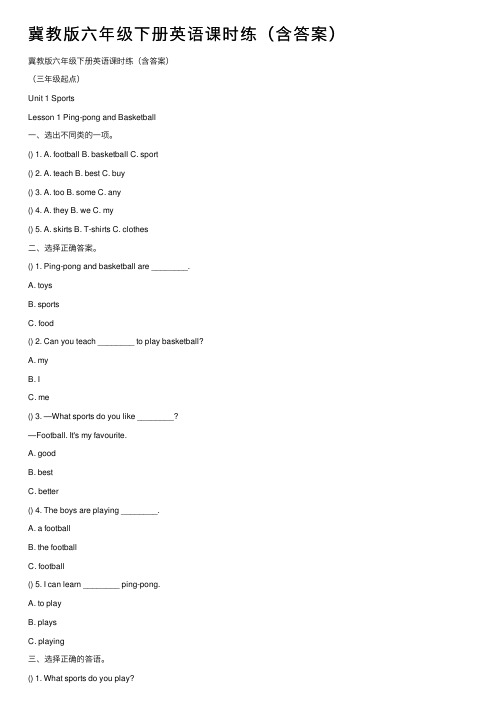
冀教版六年级下册英语课时练(含答案)冀教版六年级下册英语课时练(含答案)(三年级起点)Unit 1 SportsLesson 1 Ping-pong and Basketball⼀、选出不同类的⼀项。
() 1. A. football B. basketball C. sport() 2. A. teach B. best C. buy() 3. A. too B. some C. any() 4. A. they B. we C. my() 5. A. skirts B. T-shirts C. clothes⼆、选择正确答案。
() 1. Ping-pong and basketball are ________.A. toysB. sportsC. food() 2. Can you teach ________ to play basketball?A. myB. IC. me() 3. —What sports do you like ________?—Football. It's my favourite.A. goodB. bestC. better() 4. The boys are playing ________.A. a footballB. the footballC. football() 5. I can learn ________ ping-pong.A. to playB. playsC. playing三、选择正确的答语。
() 1. What sports do you play?() 2. Do you have any ping-pong balls?() 3. Can you teach me?() 4. What do you wear to play basketball?() 5. What clothes do you like best?C. I like T-shirts best.答案:⼀、1. C 2. B 3. A 4. C 5. C⼆、1. B 2. C 3. B 4. C 5. A三、1. E 2. B 3. D 4. A 5. CLesson 2 At the Sports Shop⼀、英汉互译。
六年级下册英语二重单词

六年级下册英语二重单词Lesson 1 ping-pong and basketball1.sport (s)2.football3.any〔用于疑问、否认句〕4.some〔用于肯定句〕5.wear6.all7.best 8.also1.Of all sports,l like basketball best !2.What sports do you play ,Li Ming .3.L play football and ping-pong .4.Ping-pong is my favourite sport .5.Teach me to play ping-pong ?6.Learn to play basketball .7.Do you have any ping-pong ball ?8.No. We can buy some .9.Let's go shopping .10.L always wear a T-shirt to play basketball .Lesson 2 at the sports shopor 2.need3.this4.that5.these6.those7.dollar(s)1.L need a T-shirt .2.Do you like this T-shirt or that T-shirt ?3.L like this T-shirt .4.Now we need some ping-pong ball .5.Do you watr these ball or those ball ?6.These ball are five dollars .Lesson 3 let's play !1.basketball2.heavy3.light4.different5.easy6.try7.hand 8.hitting9.catch 10.throw11.ready1.Are you ready to learn to play basketball ?2.Yes .3.Let me try .4.Too different ! The ball is too heavy !5.This ball is light !6.Hitting the ball to Jenny .Lesson 4 did you have fun1.buy—bought2.teach—taught3.think—thought4.learn—learned5.play—played6.go—wend7.do—did 8.want—wanted 9.hit—hit 10.eat—eta 11.see—saw 12.walk—walked 13.player 14.is/an—was1.Did you have fun today ?2.Were did you do ?3.We went to a shop .4.What did Li Ming do buy today ?5.Li Ming bought a T-shirt today .Lesson 5 a basketball game1.game2.team3.ask4.answer5.very6.policeman7.yell8.watch9win—won1.What did you do this evening ?2.We watched Bob play basketball !3.Play a game ?4.The Orange Tesm.5.Who won ?6.Bob’s team won !7.every day ?8.He is a policeman .Lesson 7 always have breakfast1.healthy2.strong3.once4.twicest6.how often7.be good for1.Everyone wants to be healthy and strong .2.Danny and Kim have breakfast last week ?3.Danny had breakfast once last week .4.Kim had basketball six times last week.5.Do you always have breakfast ?6.Yes .7.How often do you eat fruit ?8.Once a day .9.Vegetables are good for you .10.How often do you eat vegetable ?11.Twice a day .12.Fruit is good for you.13.How often do you play sports?14.Seven times a week.Lesson 8 always brush your teeth1.before2.after3.bad4.next5.brush ons’s teeth6.have breakfast7.be bad for8.get up9.from……to 10.different1.After breakfast,he goes to school .2.Want does how he do often breakfast ?3.before breakfast4.after breakfast5.That's bad for his teeth .6.What do you do before breakfast ?7.Because l want strong,healthy teeth .8.Before music class,Steven has English class . Lesson 9 eat more vegetables andfruit!1.often2.get to work3.keep4.awayLesson 10 exercise1.exercise2.do exercise3.minute4.hour5.an hour6.half an hour 1.What is exercise ?2.Riding a bike is exercise.3.Walking is exercise.4.Playing ping-pong is exercise.5.Running is exercise.6.Exercise helps make your body healthy and strong.7.How often do you exercise?8.L walk to school.9.L walk home after school.10.How many minutes do you walk?11.About five minutes.12.an hour of exercise a day13.L run for 20 minutes every morning.Lesson 11 work hard1.important2.high3.low4.else5.on time1.L work hard at school,at home and at sports.2.do my homework3.do exercise4.have fun with my friends5.clean my bebroom6.help your family7.dry the dishes8.water the flowers9.What else do you do at home?10.L clean my bedroom on Saturday.11.make my lunch.Lesson 13 summer is coming1.season 5.autumn2.winter 6.happen3.spring 7.lose4.summer 8.leaf-leaves1.What season is it?2.lt's winter.3.What happens to trees in different season?4.In winter ,it's cold and snowy.5.What colour are the leaves?6.L like to sit in the sun.7.What do you like?8.L like the fan.9.Sometimes l like to look at the clouds.Lesson 14 tomorrow we will play1.close2.angry3.will4.will-won't5.pick6.wrong7.run home8.get wet1.What will you do tomorrow ?2.We will go to the park.3.L like not fly a kite.4.L will look at the beautiful flowers in the park.5.L will pick some flowers for my mother!6.Close the door。
六年级英语 Unit2 Good Healthy to You!知识点归纳总结

Unit2 Good Healthy to You!知识点归纳总结Lesson 7 Always Have Breakfast!单词:1.healthy健康的2.strong强壮的3.time次数;时间短语:1.be good for对...有好处2.how often多久一次3.be healthy = keep healthy保持健康4.healthy food健康的食物st week上周st year去年st Sunday上周日8.on Tuesday morning在星期二上午9.have breakfast吃早餐词形变换:1.healthy健康的(名词health健康)2.healthy健康的(反义词ill有病的)3.healthy健康的(否定unhealthy不健康的)4.healthy健康的(近义词well)1.Everyone wants to be healthy and strong.每个人都想变得又健康又强壮。
2.How can we be healthy and strong?我们怎样才能变得又健康又强壮?3.It’s good for you!那对你们有好处!4.---How often did Danny and Kim have breakfast last week?上周丹尼和金多久吃一次早餐?---Danny had breakfast once last week.上周丹尼吃了一次早餐。
Kim had breakfast six times last week.上周金吃了六次早餐。
5.---When did he have breakfast?他什么时候吃的早餐?---At about 7:30 on Tuesday morning.在星期二早上7点半左右。
6.Good work, Kim!做得好,金!Lesson 8 Always Brush Your Teeth单词:1.before在...之前2.after在...之后3.bad有害的;糟糕的4.next紧接着;下一个5.brush刷6.tooth牙齿7.foot脚8.different不同的短语:1.the day before yesterday前天2.the day after tomorrow后天3.after school放学后4.be bad for对...不利5.next week下周6.tooth brush牙刷7.brush one’s teeth某人刷牙8.before breakfast在早餐之前9.after breakfast在早餐之后10.get up起床11.from ... to ...从...到... 12.from Monday to Friday从周一到周五13.work hard努力工作14.wash one’s hands and face某人洗手和脸词形变换:1.before在...之前(对应词after在...之后)2.bad糟糕的(反义词good好的)3.brush刷(第三人称单数brushes)4.tooth牙齿(复数teeth)5.foot脚(复数feet)6.different不同的(名词difference不同;区别)7.different不同的(反义词same相同的)句子:1.Li Ming has breakfast at 7:00 in the morning.李明在早上7点吃早餐。
冀教版英语六年级下册 Lesson 7 Always Have Breakfast 同步练习

Lesson 7 Always Have Breakfast!练习一、选择出不同类的单词,把序号写在题前括号内。
()1. A. usually B. often C. fruit()2. A. food B. first C.fruit()3. A. nine B.three C.first()4. A. her B. his C. I()5. A. have B.sport C. eat二、“How”的用法。
1. —____________ are these balls?— Ten yuan.2. —____________ do you eat vegetables?— I never eat vegetables.3. —____________ players are there on a team?—Five players.4. —____________do you go to Beijing?—By train.5. —____________ are you?—I’m 1.6 metres tal l.三、单项选择。
() 1. His mother ________to be healthy.A. wantB. wantsC. is want() 2. ________can he be healthy and strong?A. HowB. How oftenC. What() 3. Fruit is good ________me!A. atB. toC. for() 4. —________did Lucy have breakfast last week?—Once.A. How manyB. How muchC. How often() 5.Tony had breakfast ________about 7:10 ________ Thursday morning.A. at; inB. at;onC. on;in四、读一读,连一连。
冀教六年级英语(下)【第2单元】1652

n 9 Eat !Lesson 7 Always Have Breakfast! 2.minute[ 分( 钟)] (44) 词汇1.healthy( 健康的) (34) 3.hour( 小时) 知识点(44) 2.strong( 强壮的ꎻ有力的)(34) 1.动名词短语作主语(45)知识点1.everyone 的用法 (35) exercise 的用法 2.walk to school 与 walk home(45) (46) 2.be good for 的用法 (35) 3. 3.how often 的用法 (35) 询问某人做某事需要多少分钟的句型 4.辨析介词 atꎬon 和 in(36)(46)Lesson 8 Always Brush Your Teeth! 词汇4.be going to 的用法 5.辨析 have to 和 must (46)(47)1.before( 在之前) (37)Lesson 11 Work Hard!2.after( 在之后) (37) 词汇 3.bad( 有害的ꎻ糟糕的) (38) high( 高ꎻ高的ꎻ在高处)(48)4.next( 紧接着ꎻ下一个的) 知识点(38)知识点 1.before 的用法 (38) 1.辨析 on time 和 in time(49) 2.after 的用法(39) 2.dry 的用法 (50) 3.一般现在时的否定句 (39)3.else 的用法(50)词汇Lesson 12 Helen Keller 知识点often( 常常ꎻ经常) (41) 1.“ 特殊疑问词+动词不定式” 结构在 知识点句子中的用法 (53) 1.英语中次数的表达法 (43) 2.not at all 的用法 (53) 2.keep 的用法 (43)Lesson 10 Exercise 词汇1.exercise( 锻炼ꎻ练习)32(44)课堂培优写作园地 单元整理与复习(61) (62)本单元的主题是健康生活ꎮ 同学们ꎬ我们怎样才能变得既健康又强壮呢? 在学习本单元内容之前ꎬ咱们先读一读下面的顺口溜吧!坚持每天吃早餐( have breakfast) ꎬ经常( often) 锻炼( exercise) 身体好ꎬ 饭前( before) 要洗手( wash one’ s hands) ꎬ饭后( after) 走一走ꎬ蔬菜( vegetables) 水果( fruit) 搭配吃ꎬ告别医生( keep the doctor away) 挥挥手ꎬ 日常运动( play sports) 乐趣多ꎬ骑车( ride a bike) 跑步( run) 打篮球( play basketball) ꎬ一周两次( twice a week) 做家务ꎬ强( strong) 健( healthy) 体魄好帮手ꎮ能力目标1.了解他人用餐及运动的频率ꎬ给对方提出合理的建议ꎮ2.能够有条理地描述自己或他人一天的活动ꎮ3.能够正确地运用句型询问他人单位时间运动的次数ꎮ知识目标词汇单词 healthy 健康的 strong 强壮的ꎻ有力的 first 第一 health 健康 before 在之前 after 在之后 bad 有害的ꎻ糟糕的next 紧接着ꎻ下一个的often 常常ꎻ经常 exercise 锻炼ꎻ练习minute 分钟hour 小时high 高ꎻ高的ꎻ在高处短语 have breakfast 吃早餐 wash one’ s hands 洗手 brush one’ s teeth 刷牙 go to school 去上学 get up 起床 ride a bike 骑自行车 play sports 做运动walk to school 步行去学校 have an English class 上英语课 twice a week 一周两次 be good for 对有益处 dry the dishes 擦干盘子how often 多久一次句子1.Do you always have breakfast? 你一直坚持吃早餐吗? 2.What’ s your favourite food? 你最喜欢的食物是什么? 3.How often did Danny and Kim have breakfast last week? 上星期丹尼和金多久吃一次早餐?4.How many minutes do you walk? 你步行多少分钟? 5.What else do you do at home? 你在家里还做什么?33first发音: 字母组合ir在单词中health发音:字母组合th在单词中/ fзːst /例句:Firstꎬtalkwithyour发/ зː/ꎮ发/ /ꎮ第一友们谈一谈ꎮfriends. 首先ꎬ和你的朋/ hel/例句:Fruitisgoodforyour健康health.水果对你的健康Healthyandstrong健康又强壮( 教材第20页)拓展:second第二有益处ꎮ拓展:healthy健康的ˈɒ反义词:weak虚弱的strongerHehasastrongbody.Lesson 7 Always Have Breakfast第7课坚持吃早餐!healthy/ heli/健康的strong/ str/强壮的ꎻ有力的发音:字母组合ea在单词中发/ e / ꎮ例句:Hehasahealthylifestyle.他有一个健康的生活方式ꎮ反义词:unhealthy不健康的sick生病的拓展:healthn.健康例句: 他有一个强壮的身体ꎮ短语:healthyandstrong健康又强壮拓展:比较级为ꎬ意为“更强壮的”ꎻ最高级为strongestꎬ意为“ 最强壮的” ꎮHowoftendidDannyandKimhavebreakfastlastweek?❸34!上星期丹尼和金多久吃一次早餐?Dannyhadbreakfastoncelastweek.Whendidhehavebreakfast? 上星期丹尼吃了一次早餐ꎮ他什么时候吃早餐的?Atabout7:30onTuesdaymorning.❹大概是星期二早上7:30ꎮKimhadbreakfastsixtimeslastweek.GoodworkꎬKim!金上星期吃了六次早餐ꎮ好样的ꎬ金!Everyonewantstobehealthyandstrong.每个人都想变得健康又强壮ꎮeveryone意为“每个人” ꎮ该词是复合不定代词ꎬ复合不定代词做主语时谓语动词要用第三人称单数形式ꎮeveryone的同义词为everybody(每个人)ꎬ反义词为nobody( 没有人) ꎮ类似的词还有everything( 每件事) ꎬanything( 任何事) ꎬanyone ( 任HowoftendidDannyandKimhavebreakfastlastweek? 上星期丹尼和金多久吃一次早餐?howoften用来询问动作发生的频率ꎬ意为“ 多久一次” ꎮ答句中常见的频度副词及短语有: alwaysꎬusuallyꎬoftenꎬonceꎬneverꎬeveryday等ꎮ【例句】—Howoftendoesshevisither何人)ꎮ】Everyoneishere.parents? 她多久看望一次她的父母?例句每个人都在这里ꎮNobodyknowsit.没有人知道这件事ꎮ—Onceamonth.一月一次ꎮ—It’sgoodforyou! 这对你们有益处!begoodfor意为“对有益处”ꎮ其反义短语为:bebadfor意为“对有害”ꎮ例题:doyouplaybasketball? —Onceaweek.A.HowmanyB.Howmuch【us.【例句】Vegetablesandfruitaregoodfor蔬菜和水果对我们有益处ꎮC.HowoftenD.Howold35how often C ꎬꎬ ꎮ ) ꎮ 年ꎮ3 in ( ) ( 、 ) ꎮName:Wang HongHeight:1.45 m 姓名:王红 Weight:38 kg 身高:1.45 米 体重:38 千克我很健康并且强壮ꎮ I’ m healthy and strong. Name: Height: m 姓名: Weight: kg 身高: 米 体重: 千克 我ꎮI’ m . 【点拨】 由答句可知ꎬ问句是对动词短语play basketball 这一活动的频率提问ꎮ 对做某事的频率提问 应用 故选At about 7:30 on Tuesday morning. 大概是星期二早上7:30ꎮ介词 atꎬon 和 in(1) at 多用于较短的时间ꎬ尤其是某个具体的时刻及固定搭配中ꎬ如 at nine in the morning( 上午9:00) ꎮ【例句】They came home at 7:00 p.m.他们下午7:00 到家ꎮ(2) on 用于具体的某一天或者某个特 定的早晨、下午或晚上等ꎮ 如 on Sunday Sunday.星期日将有一场庆祝会ꎮ用于某个较长的时间 如世纪年、月、季节等) 及泛指的上午、下午、晚上等ꎮ 如 in May( 在5 月) ꎬin the morning( 在早晨 等 1980【例句】 I was born in 1980. 我出生在He often walks the dog in the evening.他经常在晚上遛狗ꎮ例题: The game is the gym7:00. A. inꎻ at B. inꎻ in C. atꎻ inD. atꎻ at( 在星期日) ꎬon a rainy morning( 在一个下雨的早晨 【点拨】 在体育馆ꎬ短语为 in the gymꎬ7:00 为时间点ꎬ时间点前应该用介词 atꎬ故 【例句】 There will be a celebration on选 AꎮLet’ s do it! 做一做! ( 教材第21 页)1.Write and say.写一写ꎬ说一说ꎮ36before 发音:字母组合 ore 在单词中发/ ɔː( r) / ꎮ短语:before lunch 午餐之前例句:Before breakfastꎬI brush my teeth.早餐前ꎬ我先刷牙ꎮ 在之前 / bIˈfɔː( r) / 反义词:after 在之后 the day before yesterday 前天 after例句:I walk to school after breakfast. 早餐后我步行去 短语:after breakfast 早餐后 学校ꎮ在之后/ ˈːftə( r) / 反义词:before 在之前形近词:often 常常ꎻ经常 2.Talk and write.说一说ꎬ写一写ꎮDo you always have breakfast?你一直坚持吃早餐吗?You should have breakfast every day.你应该每天吃早餐ꎮHow often do you eat fruit?你多久吃一次水果?Vegetables are good for you.蔬菜对你有益ꎮHow often do you eat vegetables?你多久吃一次蔬菜?Fruit is good for you. 水果对你有益ꎮHow often do you play sports?你多久做一次运动?Play sports every day. 每天都做运动ꎮBe healthy and strong.变得健康又强壮ꎮLesson 8 Always Brush Your Teeth!第 8 课 坚持刷牙!37反义词:last 上一个 a 反义词:good 好的多的甜食对你的牙齿不好ꎮ个女孩是琳达ꎮ 下一个女孩是玛丽ꎮ get up例句:I usually get up at sixget up含有 up 的短语起床ꎮo’ clock. 我通常 6:00 pick u p 捡起 起床 grow up 长大 stand up 站起来 起床反义短语: go to sleep / bedmake up 构成 弥补 编造 ꎻ ꎻ 去睡觉go up 上升ꎻ上涨ꎻ增长ꎻ建起turn up 调大ꎻ出现ꎻ来到ꎻ找到 bad/ bæd / 有害的ꎻ糟糕的next/ nekst / 紧接着ꎻ下一个的发音:字母 在单词中发/ æ / ꎮ例句:Eating too much sweet is bad for your teeth. 吃太短语:bad habit 坏习惯 be bad for 对有害例句:The first girl is Linda. The next one is Mary. 第一短语:next time 下一次 next week 下周形近词:nest 鸟窝text 课文Before and after 之前与之后( 教材第22 页)Li Ming has breakfast at 7:00 in the morning. Before breakfastꎬ he washes his hands and brushes his teeth.❶After breakfastꎬ he goes to school.❷李明在早上7:00 吃早餐ꎮ 早餐前ꎬ他洗手刷牙ꎮ 早餐后ꎬ他去上学ꎮbefore breakfast早餐前 breakfast 早餐时 after breakfast早餐后Danny never brushes his teeth after dinner. That’ s bad for his teeth.丹尼晚饭后从来不刷牙ꎮ 那样对他的牙齿有害ꎮBefore breakfastꎬ he washes his hands and brushes his teeth.早餐前ꎬ他洗手刷牙ꎮbefore 作介词ꎬ意为“ 在之前” ꎬ既可以表示在时间之前ꎬ如 before six o’ clock( 在6:00 之 前) ꎬ也可表示在地点之前ꎮ【例句】BeforebreakfastꎬIwalkinthepark.早餐前ꎬ我在公园里散步ꎮHesitsbeforeme.他坐在我前面ꎮ38Jenny doesn’ t go to school on those days.詹妮那些天不用去上学ꎮ一般现在时的否定句:含有实义动词的一般现在时的否定句ꎬ如果主语是第三人称单数ꎬ要在主语后面加上doesn’tꎬ同时动词要还原成原形ꎮ 主语不是第三人称单数ꎬ在主语后加上don’tꎮ【例句】Jenny doesn’ t get up at six in the morning.詹妮不在早上六点起床ꎮ I don’ t want to do my homework in the evening. 我不想在晚上做我的家庭作业ꎮ 例题:Li Ming does his homework every day.( 变为否定句)Jenny’ s week 詹妮的一周( 教材第22 页)Jenny goes to school five times a weekꎬ from Monday to Friday.She gets up at 7:00 in the morning. Firstꎬ she washes her hands and faceꎬ and then she brushes her teeth. Nextꎬ she has breakfast. Then she goes to school. She works hard at school. Saturday and Sunday are different. Jenny doesn’ t go to school on those days.❸从星期一到星期五ꎬ詹妮每周去学校五次ꎮ她早上7:00 起床ꎮ 首先ꎬ她洗手和脸ꎬ然后她刷牙ꎮ 接着ꎬ她吃早餐ꎮ 然后她去上学ꎮ她在学校努力学习ꎮ 星期六和星期日是不同的ꎮ 詹妮那些天不用去上学ꎮafter 作介词ꎬ意为“在之后(表示时间)”ꎬ还可意为“跟随ꎻ追赶ꎮ” After breakfastꎬ he goes to school.早餐后ꎬ他去上学ꎮ Shut the door after you.随手关门ꎮ【例句】I walk home after school.放学后我步行回家ꎮ 39Let’sdoit!做一做! ( 教材第23页)1.Lookandsay.ThentalkaboutyourMondaymorning.看一看ꎬ说一说ꎮ然后谈一谈你的星期一上午ꎮAftermathclassꎬStevenhasChineseclass.数学课后ꎬ史蒂文上语文课ꎮhave/has除了当“有”讲ꎬ还可以意为“从事ꎻ进行”ꎬ构成词组“have/has ( +a/an) +科目”ꎬ意为“上课”ꎮhasChineseclass意为“上语文课”ꎮ【例句】IhaveanEnglishclassthisafternoon.我今天下午有节英语课ꎮ与have有关的短语还有:havealesson( 上课) ꎬhavealook( 看一看) ꎬhavearest( 休息一下) ꎬhaveatalk( 谈话) ꎮ2.Lookandwrite.看一看ꎬ写一写ꎮ( 教材第23页)Jennygetsupat7:00.詹妮7:00起床ꎮ40参考答案washes her face brushes her teeth has breakfast goes to schooloften例句:She often draws pictures on Saturdays.她经常在星短语:how often 多久一次期六画画ꎮ常常ꎻ经常/ ˈɒfn / 近义词:usually 通常形近词:after 在之后Firstꎬ she and.首先ꎬ她和ꎮNextꎬ she . Then she . 接下来ꎬ她ꎮ 然后她ꎮLesson 9 Eat More Vegetables and Fruit!第 9 课 多吃蔬菜和水果!41Let’sgettowork!让我们开始工作! ( 教材第24页)HowoftendoesDannyeatvegetablesandfruit? Let’ssee.丹尼多久吃一次蔬菜和水果? 让我们看一看ꎮ42Let’ s do it! 做一做! ( 教材第25 页)Talk and write.谈一谈ꎬ写一写ꎮtwice a week 意为“ 一星期两次” ꎮ 英语中次数的表达方法为:once( 一次) ꎬtwice( 两次) ꎬ基 I eat potatoes and tomatoes about twice a week.我大约一星期吃两次土豆和西红柿ꎮa year一年三次数词+times( 三次或三次以上) ꎮ 例如:once a year 一年一次 twice a year 一年两次 three times 例题:Jenny goes to school five ( time) a week.An apple a day keeps the doctor away! 一天一个苹果ꎬ医生远离我! 【点拨】 本句意为“五次”ꎬ表达次数的短语为“基数词+times(三次或三次以上)”ꎬ故用timesꎮ 物远离” ꎮ 远离某人还可以表达为“ keep away from sb.” ꎮkeep 的意思是“ 使某人或某物处于一种的状态” ꎬkeep sb. / sth. away 意为“ 使某人或某 【例句】Please keep away from that man.请远离那个男人ꎮ43锻炼ꎻ练习minute/ ˈeksəsaIz / 拓展:exercise 也作动词ꎬ意为“ 锻炼” ꎮ 短语:do exercise 锻炼例句:—How many minutes are there in an hour? 一小发音:字母 u 在单词中发/ I / ꎮ/ ˈmInIt / 时有多少分钟?分( 钟)短语: wait a minute 等一等—Sixty minutes.六十分钟ꎮ i在早上做锻炼吗?noodles juice fish apple bread egg ice cream 面条 果汁 鱼 苹果 面包 鸡蛋 冰淇淋 orange fruit rice cake chicken meat vegetables 橙子水果米饭蛋糕鸡肉 肉蔬菜Lesson 10 Exercise第 10 课 运动exercise发音:字母 在单词中发/ aI / ꎮ 例句:Do you often do exercise in the morning? 你通常/ ˈaʊə( r) / hour同音词:our 我们的例句:I’ll leave here in an hour.我一个小时后离开这里ꎮ 发音:字母 h 在单词中不发音ꎮ小时形近词:your 你的ꎻ你们的 four 四44Whatisexercise? 什么是锻炼? ( 教材第26页)Ridingabikeisexercise.❶骑自行车是锻炼ꎮWalkingisexercise. 步行是锻炼ꎮPlayingping ̄pongisexercise.打乒乓球是锻炼ꎮRunningisexercise.跑步是锻炼ꎮExercisehelpsmakeyourbodyhealthyandstrong.锻炼有助于你的身体变得健康和强壮ꎮRidingabikeisexercise.骑自行车是锻炼ꎮ( 1) 句中的主语ridingabike是一个动名词短语ꎮ其中riding是动词 ̄ing形式ꎬ起名词的作用ꎬ作主语时ꎬ谓语动词用第三人称单数形式ꎮ【例句】Eatingvegetablesisgoodforyou.吃蔬菜对你有好处ꎮ动名词在句子中除了可以做主语外ꎬ还可以充当其他句子成分ꎮ如:①作表语ꎬ放在be动词的后面ꎮ【例句】Myhobbyisdrawing.我的爱好是画画ꎮ②作宾语ꎬ放在实义动词的后面ꎮ【例句】Ilikeplayingping ̄pong.我喜欢打乒乓球ꎮ45③作定语ꎬ修饰名词ꎬ放在名词之前ꎮ【例句】It’saswimmingpool.这是一个游泳池ꎮ(2) exercise作名词时ꎬ既可作不可数名词ꎬ意为“ 锻炼” ꎬ也可作可数名词ꎬ意为“练习ꎻ练习题” ꎮdoexercise做锻炼(不可数名词) ꎬdomorningexercises做早操( 可数名词)ꎮ例题: Doyoudoeye( exercise)?【点拨】做眼保健操的固定短语是“ doeyeexercises” ꎬ故答案为exercisesꎮexercise还可作动词ꎬ意为“ 锻炼” ꎮ【例句】Iexercisefiftyminutesaday.我一天锻炼50分钟ꎮꎮ ? How many minutes does Danny exercise?丹尼锻炼多少分钟? ( 教材第26 页)I walk to school in the morningꎬ and I walk home after school. 我早上步行去学校ꎬ放学后步行回家ꎮwalk to school = go to school on foot( 步行去学校) ꎻwalk home = go home on foot ( 步行回家) ꎮ school 是地点名词ꎬ所以 walk 后面有介词 toꎮ home 是表示地点的副词ꎬ所以 walk 后面的介词 to 要省略ꎮ例句】Walking to school is exercise.步How many minutes do you walk? 你步行多少分钟?询问某人做某事用多少分钟ꎬ句型为 “ How many minutes+do / does+主语+动词原形+ 其他?”ꎮ 同时ꎬ注意区别 how many 和 how much 的用法ꎮ how many 和how much 都可以用来提问数量ꎮ 前者是对可数名词的数量提问ꎬ而后者是对不可数名词的数量提问ꎮ【例句】How many pencils do you have? 你有多少支铅笔?How much water do you need? 你需要I’ m going to watch more sports on TV! 我会在电视上看更多的运动!本句是含有一般将来时的句子ꎬ用于 描述某( 些) 人将要做某事ꎮ 句型结构:主语+be 动词( amꎬisꎬare)+going to +动词原形+其他.多少水 行上学是种锻炼【ꎮ【 】 “ ” ꎬ 【例句】I am going to have a rest in the afternoon.我打算在下午休息一下ꎮShe is going to fly a kite tomorrow. 她明天打算去放风筝ꎮ表示一般将来时的句型还有:主语+will+动词原形+其他.【例句】I will have a rest in the afternoon. 我打算在下午休息一下ꎮShe will fly a kite tomorrow.她明天将去放风筝 You have to play sports for exercise! 你必须靠做运动来锻炼!have to 意为“ 必须ꎻ不得不” ꎬ在这个意义上与 must 很接近ꎮ 但是要注意区别have to 和 mustꎮ have to 有时态的变化ꎬ多表示客观需要ꎬ译为“ 不得不” ꎮ must 是情态动词ꎬ无时态的变化ꎬ多表示主动需要或 有义务去做某事ꎬ多译为“ 必须” ꎮ【例句】My mother is ill. I have to stay at home.我妈妈病了ꎮ 我不得不待在家里ꎮI must work hard.我必须努力学习ꎮ 例题: ( 1 ) Ileave schoolbecause of my poor family.( 不得不)( 2) Iclean my room because it’s too dirty.( 必须)点拨 第一题为 不得不 之意 故填 have toꎮ 第二题强调主观意图ꎬ 故填 mustꎮLet’ s do it! 做一做! ( 教材第27 页)Read and write.读一读ꎬ写一写ꎮExercise helps make our bodies healthy and strong. I run for 20 minutes every morning. Ping ̄pong is my favourite sport. I play ping ̄pong three times a week. That’ s an hour and a half a week. I play basketball twice a week. That’ s two hours of exercise a week. How many minutes do I exercise a week?锻炼有助于使我们身体健康又强壮ꎮ 我每天早上跑步20 分钟ꎮ 乒乓球运动是我最喜欢47的运动ꎮ我一星期打三次乒乓球ꎬ即一星期一个半小时ꎮ我一星期打两次篮球ꎬ即一星期锻炼两个小时ꎮ我一星期锻炼多少分钟?I我参考答案 I exercise 350 minutes a week.I walk for 30 minutes every morning. Basketball is my favourite sport. I play basketball minutes of exercise a week.twice a week. That’ s 40 minutes a week. I dance five times a week. That’ s 150 I exercise minutes a week. 我每星期锻炼分钟ꎮI’ m healthy and strong. 我很健康又强壮ꎮHow about you?你呢?Lesson 11 Work Hard! 第 11 课 努力学习!high/ haI / 高ꎻ高的ꎻ在高处发音:字母组合 igh 在单词中发/ aI / ꎮ 例句:It’ s a high mountain.它是一座高山ꎮ 拓展:high 的比较级为 higherꎬ最高级为 highestꎮI always go to school on time.❶我总是按时上学ꎮI always do my homework. 我总是做我的家庭作业ꎮI do exercise every day! 我每天锻炼!I have fun with my friends. 我和我的朋友们玩得很开心ꎮI help my parents.我帮助我的父母ꎮI clean my bedroom. 我打扫我的卧室ꎮYou can do it! 你能做到! ( 教材第28 页)正好或恰好在需要的时候做某事ꎮon time 意为“ 按时ꎬ准时” ꎬ表示在某一固定或规定的时间做某事ꎮ in time 意为“ 及时” ꎬ表示 I always go to school on time.我总是按时上学ꎮ The doctor was in time to save the boy’ s life.医生及时地挽救了那个男孩的生命ꎮ与time 有关的短语:at the same time(同时)ꎬall the time(一直)ꎬby the time(到时候)ꎮ【例句】I always go home on time.我总是按时回家ꎮ49DoesKimworkhard? 金劳动努力吗? (教材第29页)Ialwaysdrythedishesafterdinner.晚饭后我总是擦干盘子ꎮdry在此处是动词ꎬ意思是“把弄干” ꎮdry还可以作形容词ꎬ意思是“干的” ꎮ【例句】Drythefloorꎬplease.请把地板弄干ꎮThefloorisdry.地板是干的ꎮWhatelsedoyoudoathome? 你在家里还做什么?(1) else为副词ꎬ与不定代词( somethingꎬanythingꎬsomeoneꎬsomewhere等) 连用时ꎬ位于这些词后面ꎬ意为“另外ꎻ其他” ꎮ【例句】Ihavesomethingelsetodo.我还有其他的事要干ꎮ(2) else还可用在疑问词( whoꎬwhatꎬwhere等) 的后面ꎬ表示强调ꎮ【例句】WhoelsewantstoplaybasketballnextSunday? 还有谁想下个星期日打篮球? Whatels50Let’schant!唱一唱! ( 教材第29页)Everyoneꎬeveryoneꎬ每个人ꎬ每个人ꎬReachuphigh!把手举高!Everyoneꎬeveryoneꎬ每个人ꎬ每个人ꎬTouchthesky!触摸天空! Everyoneꎬeveryoneꎬ每个人ꎬ每个人ꎬTurnaround!转一圈!Everyoneꎬeveryoneꎬ每个人ꎬ每个人ꎬTouchtheground! 触摸地面!Everyoneꎬeveryoneꎬ每个人ꎬ每个人ꎬBenddownlow.向下弯腰ꎮEveryoneꎬeveryoneꎬ每个人ꎬ每个人ꎬTouchyourtoes.摸摸你的脚趾ꎮLesson 12 Helen Keller第12课海伦凯勒Storytime故事时间( 教材第30~31页)HelenKellerwasbornintheU.S. in1880.Whenshewas19monthsoldꎬshefellillandbecamedeafandblind.海伦凯勒于1880年出生在美国ꎮ当她19个月大的时候ꎬ她生病了并且变得失聪、51失明ꎮHerparentslovedherverymuchꎬbuttheydidnotknowhowtohelpher.❶她的父母很爱她ꎬ但是他们不知道如何帮她ꎮShecouldn’tseeanything.Shecouldn’thearanything.Shecouldn’tspeakatall.❷Helenoftengotangry.Sometimesꎬshethrewherfoodfromthetable.她什么都看不见ꎮ她什么也听不见ꎮ她根本不会说话ꎮ海伦经常生气ꎮ有时ꎬ她把她的食物从桌子上扔出去ꎮIn1887ꎬherparentsmetateacherꎬAnneSullivan.AnnebecameHelen’sfriend.ShewantedtoteachHelenwords.Butitwasveryhard.在1887年ꎬ她的父母遇到了一位老师ꎬ安妮沙利文ꎮ安妮成了海伦的朋友ꎮ她想教海伦单词ꎮ但是那非常困难ꎮOnedayꎬAnnetookHelen’shandandletherfeelthewater.Shewrotetheword“water”onHelen’shand.AndHelengotit.有一天ꎬ安妮拉着海伦的手ꎬ让她感受水ꎮ她在海伦的手上写了“water”这个单词ꎮ海伦理解了它ꎮFromthatdayonꎬHelenKellerbegantostudyeveryday.Sheworkedveryhard.Helenlearnedmanynewwordseveryday.从那天起ꎬ海伦凯勒开始每天学习ꎮ她学习很努力ꎮ海伦每天学习许多新单词ꎮ52Shelearnedtospeakꎬreadandwrite.Whenshewas20yearsoldꎬshewenttouniversity.Laterꎬshebecameagreatwriter.她学着讲话、阅读和写作ꎮ当她20岁的时候ꎬ她上了大学ꎮ后来ꎬ她成为一名伟大的作家ꎮOneofherfamousbooksisTheStoryofMyLife.Helen’sstorygiveseveryonehope.«我的生活» 是她的诸多名作之一ꎮ海伦的故事给了每个人希望ꎮHerparentslovedherverymuchꎬbuttheydidnotknowhowtohelpher.她的父母很爱她ꎬ但是他们不知道如何帮她ꎮhowtohelpher意为“如何帮她” ꎬ是“特殊疑问词+动词不定式”结构ꎬ通常在句中作宾语、表语等ꎮ【例句】Doyouknowhowtokeephealthy? 你知道怎样保持健康吗? ( 作宾语) Thequestioniswheretoputit.问题是把它放在哪里ꎮ(作表语)Shecouldn’tspeakatall.她根本不会说话ꎮnotatall用来表示否定ꎬ意为“ 一点儿也不ꎻ根本不” ꎮ【例句】Iamnottiredatall.我一点儿也不累ꎮShedidn’twanttogooutatall.她一点儿也不想出去ꎮ注意区别notatall和notatallꎮnotatall用来回答感谢ꎬ表示“不用谢ꎬ不客气” ꎮ或者53是回答对方的道歉ꎬ表示“ 没关系” ꎮ【例句】—Thankyouverymuch.非常感谢ꎮ—Notatall.不客气ꎮ—I’msorry.对不起ꎮ—Notatall.没关系ꎮAgain , Please!请再做一遍!Listen and tick. 听一听ꎬ并打“ √” ꎮ ( 教材第32 页)参考答案 speak at all. Because she couldn’ t see anythingꎬ she couldn’ t hear anything and she couldn’ tYesꎬ I do.Yes ꎬ she was. work harder than before.Though she was blind and deafꎬ she didn’ t give up. We could learn from her andWhy did Helen often get angry? 海伦为什么经常生气? Was Helen’ s teacher great? 海伦的老师伟大吗?Do you know the book The Story of My Life? 你知道« 我的生活» 这本书吗?54参考答案 1.右图 2.左图 3.上图 4.右图 5.左图 6.左图1.—How many minutes do you play ping ̄pong? —About 30 minutes.2.Before breakfastꎬ he washes his hands. 3.—How often do you eat breakfast? —Five times a week.4.—What vegetables do you like? —I like tomatoes.5.This flower is strong and healthy. 6.Riding a bike is exercise.1.———你打乒乓球多少分钟? ———大约 30 分钟ꎮ 2.在早餐前ꎬ他洗手ꎮ3.———你多久吃一次早餐? ———一周五次ꎮ 4.———你喜欢什么蔬菜? ———我喜欢西红柿ꎮ 5.这花又强壮又健康ꎮ6.骑自行车是锻炼ꎮ图片里ꎬ左图与右图或上图与下图的差异ꎮ解题指导:1.听录音前ꎬ先仔细观察图片ꎬ了解图片内容ꎬ快速比较每一幅 内容概括:这六段录音分别谈论了时间、日常行为、频率、蔬菜、植物和锻炼ꎮ内容相符的图片打“ √” ꎮ2.听录音时ꎬ注意听清表达时间、日常行为、频率、蔬菜等的词语ꎬ给与录音55Listen and write. 听一听ꎬ写一写ꎮ ( 教材第32 页)My name is Jim. I am a boy. Every morningꎬ Iat 7o’ clock.I run for aboutin the park.I go toschoolꎬ I have breakfast. I walk to school every day.helps make my body . After schoolꎬ I play football for about one. Do you like to play sports?我的名字是吉姆ꎮ 我是一个 男孩ꎮ 每天早上ꎬ我 7:00 ꎮ 我在公园里跑大约 ꎮ 我去上学ꎬ我吃早餐ꎮ 我每天步行去学校ꎮ有助于使我的身体ꎮ 放学后ꎬ我踢大约 足球ꎮ 你喜欢做运动吗?My name is Jim. I am a healthy boy. Every morningꎬ I get up at 7 o’ clock. Nextꎬ I run for about thirty minutes in the park. Before I go to schoolꎬ I have breakfast. I walk to school every day. Exercise helps make my body strong. After schoolꎬ I play football for about one hour. Do you like to play sports?我的名字叫吉姆ꎮ 我是一个健康的男孩儿ꎮ 每天早上ꎬ我七点起床ꎮ 然后ꎬ我在公园里跑大约 30 分钟ꎮ 我去上学之前ꎬ我吃早餐ꎮ 我每天步行去上学ꎮ 锻炼有助于我的身体( 变得) 强壮ꎮ 放学后ꎬ我踢大约一小时足球ꎮ 你喜欢做运动吗?2.听录音时ꎬ注意听清 healthyꎬget upꎬstrong 等关键词汇ꎮ解题指导:1.听录音前ꎬ先阅读书中的短文ꎬ初步判断所缺部分的词性ꎮ 内容概括:这段录音描述了吉姆的作息时间和运动习惯ꎮ参考答案 healthy get upNext thirty minutesBefore Exercise strong hourListen and number. 听一听并排序ꎮ ( 教材第33 页)56参考答案 4 5 1 2 6 3Helloꎬ I’ m Jenny. I often get up at 7 o’clock. First I put on my clothes. Before I have breakfastꎬ I brush my teeth and wash my hands. Nextꎬ I have breakfast. After breakfastꎬ I go to school.你好ꎬ我是詹妮ꎮ 我经常 7: 00 起床ꎮ首先我穿上我的衣服ꎮ 在我吃早餐之前ꎬ我刷牙和洗手ꎮ 然后ꎬ我吃早餐ꎮ 早餐后ꎬ我去上学ꎮ内容概括:这段录音描述了詹妮的作息时间ꎮ解题指导:1.听录音前ꎬ先观察书中的图片ꎬ熟悉每幅图中的人物在做什么ꎮ 2.听录音时ꎬ注意听清 get upꎬput onꎬwash my handsꎬhave breakfast 等关键词汇ꎬ根据听到的内容给图片标号ꎮLook and write. 看一看ꎬ写一写ꎮ ( 教材第33 页)Li Minggets up at 7:00.He at 7:10.He at 7:15.李明在7:00 起床ꎮ他在7:10ꎮ他在7:15ꎮHeat7:20.他在7:20ꎮHeat7:40.他在7:40ꎮHeat8:00.他在8:00ꎮ57gotoschoolhavebreakfastwashhisface上学吃早餐洗脸haveanEnglishclassbrushhisteethgetup上英语课刷牙起床参考答案washeshisfacebrusheshisteethhasbreakfastgoestoschoolhasanEnglishclassReadanddraw.Thenwrite.读一读ꎬ画一画ꎮ然后写一写ꎮ(教材第34页)Arethesegoodtoyourhealth? Drawor.这些对你的健康有好处吗? 画或ꎮ58参考答案I get up early every day. I exercise for about an hour every morning. Then I have to bed at 8 o’ clock.breakfast. I go to school on foot. After schoolꎬ I play basketball with my friends. I goRead and follow the directions. 读短文ꎬ按要求完1.Read and write.读一读ꎬ写一写ꎮa. he gets upꎬ he watches TV.他起床 ꎬ他看电视ꎮb.he has lunchꎬ he plays computer games.他吃完午餐 ꎬ他玩电脑游戏ꎮc. dinnerꎬ he drives to buy some ice cream and cake.晚餐 ꎬ他开车去买一些冰淇淋和蛋糕ꎮ d. 2:00 a.m.ꎬ he goes to bed.凌晨两点ꎬ他上床睡觉ꎮ成下列各题ꎮ ( 教材第35 页)Healthy or Not?Mr. Black is a very fat man. He always gets up very late in the morning. He never has breakfast. After he gets upꎬ he sits in a chair and watches TV for about two afternoon. In the eveningꎬ he drives to buy some ice cream and cake for dinner. hours. Nextꎬ he eats fast food for lunch. Thenꎬ he plays computer games in the Is he a healthy man?He never goes to bed before 2:00 in the morning. 是否健康?布莱克先生是一个很胖的人ꎮ 他早晨总是很晚起床ꎮ 他从不吃早餐ꎮ 起床后ꎬ游戏ꎮ 晚上ꎬ他开车去买一些冰淇淋和蛋糕作晚餐ꎮ 他从不在凌晨2:00 之前睡觉ꎮ他坐在椅子上ꎬ看大约2 小时的电视ꎮ 接下来ꎬ他午餐吃快餐ꎮ 然后ꎬ他下午玩电脑 他是一个健康的人吗?59• Do you always brush your teeth after dinner?晚饭后你总是刷牙吗?• How often do you brush your teeth?你多久刷一次牙?• Do you often help your parents?你经常帮助你的父母吗?• How often do you have breakfast?你多久吃一次早饭?• How many minutes a day do you exercise?你每天锻炼多少分钟?2.Read and number.读一读并标序号ꎮThink and talk. 想一想ꎬ谈一谈ꎮ ( 教材第36 页)参考答案 Yesꎬ I do.I have breakfast every day.About thirty minutes a day.I brush my teeth twice a day. Yesꎬ I do.参考答案 1. a.After b.After c.Before d.After 2. 3 4 5 2 6 160课堂培优写作园地How am I doing? 我做得怎么样? ( 教材第36 页)请用英文介绍一位你的好朋友ꎬ要求不少于60 词ꎮI have a good friend. Her name is Linda. She我有一位好朋友ꎮ 她的名字叫琳often helps her mother do housework. She often plays ping ̄pong. She likes riding a bike after school. She plays sports every day. It’ s good for her. Sheis healthy and strong. We often do our homework on Sunday morning. She’ s a good student. I like her very much.1.时态:一般现在时ꎮ达ꎮ 她经常帮她的妈妈做家务ꎮ 她经常打乒乓球ꎮ 她喜欢放学后骑自行车ꎮ她每天做运动ꎮ 这对她有好处ꎮ 她既健康又强壮ꎮ 我们经常在星期日的早上做家庭作业ꎮ 她是一个好学生ꎮ 我非常喜欢她ꎮ2.写作思路:首先对人物进行基本的介绍ꎬ然后按时间顺序来介绍他/ 她的日常行为活动ꎬ最后陈述你对朋友的评价ꎮ 3.必备词汇:often( 常常ꎻ经常) ꎬlike( 喜欢) ꎬplay sports( 做运动) ꎬbe good for( 对有好处) ꎬbe healthy and strong( 既健康又强壮) ꎮ614.必备句型:SheoftenꎻSheisꎻShelikes请用英文介绍你的一个朋友或家人的日常生活ꎮ参考答案MyLittleSister我的妹妹MylittlesisterisMary.Sheis12yearsold.Sheoftengetsupatsixinthemorning. Thenshewashesherfaceandbrushesherteeth. Shehasaquickbreakfastandthengoestoschoolonfoot.Shelikesplayingping ̄pong. Shethinksit’ sgoodforhereyes. Sheplaysiteveryday. Ilovemylittlesister.我的妹妹叫玛丽ꎮ她12岁ꎮ她总是早上六点起床ꎮ然后她洗脸和刷牙ꎮ她快速吃完早餐ꎬ然后步行去上学ꎮ她喜欢打乒乓球ꎮ她认为那对她的眼睛有好处ꎮ她每天都打乒乓球ꎮ我爱我的妹妹ꎮ单元整理与复习62have breakfast 吃早餐 wash one’ s hands 洗手 brush one’ s teeth 刷牙go to school 去上学 get up 起床ride a bike 骑自行车play sports 做运动walk to school 步行去学校how often 多久一次 twice a week 一周两次 be good for 对有益处 dry the dishes 擦干盘子have an English class 上英语课询问做某事的频率的句型及答语—How often do you eat donuts? 你多久吃一次面包圈? —Twice a day.一天两次ꎮ某人在某个时间前/ 后做了某事的句型1 Before breakfastꎬ he washes his hands and brushes his teeth.早餐前ꎬ他洗手刷牙ꎮ2 After breakfastꎬ he goes to school.早餐后ꎬ他去上学ꎮ某人在某个时间上某课的句型After math classꎬ Steven has Chinese class.数学课后ꎬ史蒂文上语文课ꎮ使某人或某物处于某种状态的句型 An apple a day keeps the doctor away! 一天一个苹果ꎬ医生远离我!“ 特殊疑问词+动词不定式” 作宾语的句型 They did not know how to help her.他们不知道如何帮她ꎮ询问对方做某事花费了多少分钟的句型How many minutes do you walk? 你步行多少分钟?63。
六年级,下册英语基本功第七课答案

Unit 2 Good health to youLesson 7 Always Have Breakfast同步练习一、汉译英1.健康的2.强壮的3.首先4.一次5.对......有好处6.多久一次7.六次二、英译汉1. Everyone wants to be healthy and strong.2.How can we be healthy and strong?3.First,always have breakfast.4.You should have breakfast everyday.三、连词组句st,Kim,how,did,have,week,breakfast,often?2.had,once,Danny,last,breakfast,week3.breakfast,when,he,have,did4.how,do,vegetables,often,eat,you四、按要求完成句子。
1.Danny played sports once last week.(对画线部分提问)2.Li Ming got up at 6 o'clock.(对画线部分提问)3.Do you always have breakfast?(作肯定回答)五、根据课本20页的图片判断正误。
( ) 1.Danny had breakfast once last week.( ) 2.Kim didn't have breakfast last Friday.( )3.Dannyhadbreakfastat6:15onTuesdaymorning. ( ) 4.Li Ming has breakfast everyday.参考答案1.healthy2. strong3. first4. once5. be good for6. how often7. six times二、 1. 每个人都想健康强壮。
平舆县XX小学六年级英语语法第四单元词汇语法解析素材1牛津版
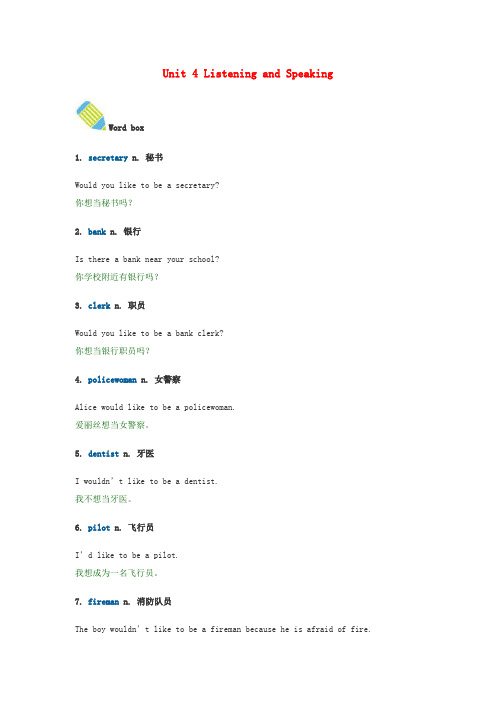
Unit 4 Listening and SpeakingWord box1. secretary n. 秘书Would you like to be a secretary?你想当秘书吗?2. bank n. 银行Is there a bank near your school?你学校附近有银行吗?3. clerk n. 职员Would you like to be a bank clerk?你想当银行职员吗?4. policewoman n. 女警察Alice would like to be a policewoman.爱丽丝想当女警察。
5. dentist n. 牙医I wouldn’t like to be a dentist.我不想当牙医。
6. pilot n. 飞行员I’d like to be a pilot.我想成为一名飞行员。
7. fireman n. 消防队员The boy wouldn’t like to be a fireman because he is afraid of fire.这个男孩不想当消防员,因为他害怕火。
8. postman n. 邮递员I’d like to be a postman.我想当邮递员。
9. shop assistant n. 店员,售货员I wouldn’t like to be a shop assistant.我不想成为店员。
10. person n. 人That person makes sick people better. 那人能让病人身体好转。
11. teach v. 教Miss Gao teaches children English.高老师教孩子们英语。
12. put out扑灭Firemen put out fires.消防队员灭火。
Language focus1. Would you like to be a cook?(1)Would like to be想要成为(2)Wouldn’t like to be不想成为(3)would like to do=want to do 想要去做(4)Would you like to be…?你想要成为…吗?—Yes, I would.是的,我想。
lesson 7 always have breakfast! 同步练习知识讲解
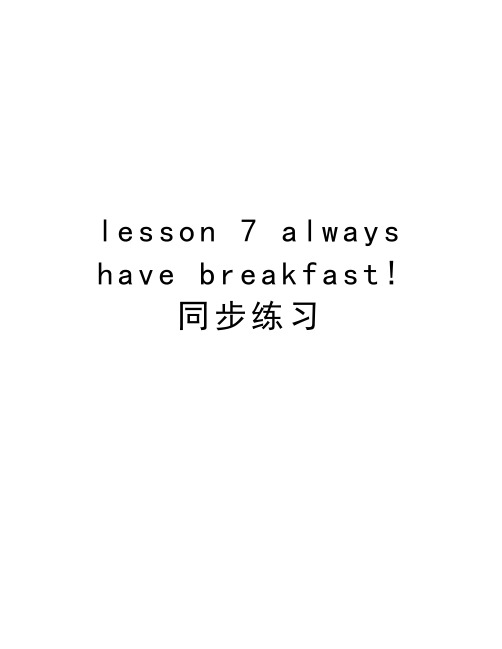
l e s s o n7a l w a y s h a v e b r e a k f a s t!同步练习lesson 7 Always Have Breakfast!一、谁与我同类。
() 1. Sunday A. today B. week C. Wednesday() 2. breakfast A. lunch B. have C. once() 3. once A. one B. four times C. food() 4. often A. last B. never C. fruit() 5. strong A. morning B. vegetables C. healthy二、我会选。
() 1. My uncle ________to be healthy.A. wantB. wantsC. is want() 2. ________can he be healthy and strong?A. HowB. How oftenC. What() 3. Fruit is good ________me!A. atB. toC. for() 4. —________did Lucy have breakfast last week?—Once.A. How manyB. How muchC. How often() 5. She had breakfast ________about 7:10________Thursday morning.A. at; inB. at;onC. on;in四、选出与句子相符的图片。
() 1. The man is strong.() 2. Vegetables are good for you.() 3. I like healthy food.() 4. I always have breakfast.() 5. I have breakfast at about 7:00 in the morning.A. B. C. D. E.五、“How”的用法大比拼。
六年级英语下册Lesson 7 Always Have Breakfast!冀教版 (13)

First, always have breakfast. It’s good for you!
频度副词定义 :
英语中always, often, sometimes, never等,叫做频度副词。这类词用来 表示某一动作发生的频率,或某一状 态出现的频率,即在一定的时间内动 作重复发生或状态重复出现的次数。
1.How often did Kim have
Kim had brberaekafkafasstts?ix times last week.
2.When did Kim have breakfast ?
She had breakfast at 7:15
关于上一周看电视情况的调查结果
Sunday Monday Tuesday
How can we be healthy and strong?
我们怎么样才可以变得强壮?
Eat some vegetables and fruits every day.
Do exercise every day. You can walk, run, swim and play ball games.
How often… 多久一次
次数的表达 once/twice/three times/four times…
Wednesd Thursday ay
Friday
Saturday
Li Ming √
√
√
√
√
√
√
Peter
√
√
Tom √
√
√
Jing
√
Pair work Hoபைடு நூலகம் often did you ____ last week?
冀教版六年级下英语课文翻译
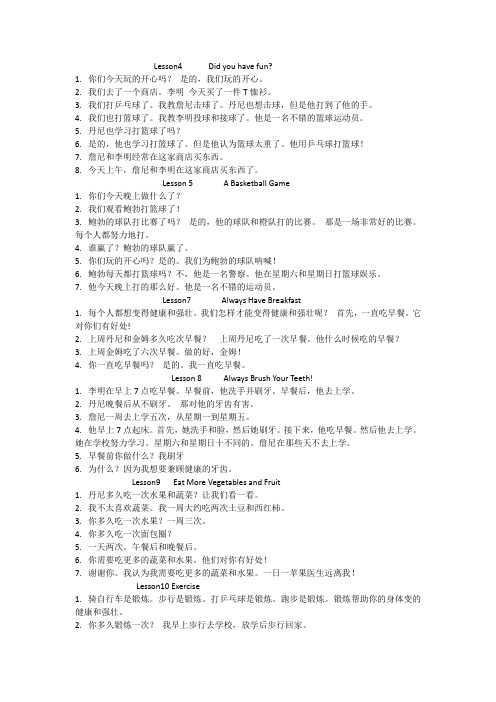
Lesson4 Did you have fun?1.你们今天玩的开心吗?是的,我们玩的开心。
2.我们去了一个商店。
李明今天买了一件T恤衫。
3.我们打乒乓球了。
我教詹尼击球了。
丹尼也想击球,但是他打到了他的手。
4.我们也打篮球了。
我教李明投球和接球了。
他是一名不错的篮球运动员。
5.丹尼也学习打篮球了吗?6.是的,他也学习打篮球了。
但是他认为篮球太重了。
他用乒乓球打篮球!7.詹尼和李明经常在这家商店买东西。
8.今天上午,詹尼和李明在这家商店买东西了。
Lesson 5 A Basketball Game1.你们今天晚上做什么了?2.我们观看鲍勃打篮球了!3.鲍勃的球队打比赛了吗?是的,他的球队和橙队打的比赛。
那是一场非常好的比赛。
每个人都努力地打。
4.谁赢了?鲍勃的球队赢了。
5.你们玩的开心吗?是的。
我们为鲍勃的球队呐喊!6.鲍勃每天都打篮球吗?不,他是一名警察。
他在星期六和星期日打篮球娱乐。
7.他今天晚上打的那么好。
他是一名不错的运动员。
Lesson7 Always Have Breakfast1.每个人都想变得健康和强壮。
我们怎样才能变得健康和强壮呢?首先,一直吃早餐。
它对你们有好处!2.上周丹尼和金姆多久吃次早餐?上周丹尼吃了一次早餐。
他什么时候吃的早餐?3.上周金姆吃了六次早餐。
做的好,金姆!4.你一直吃早餐吗?是的。
我一直吃早餐。
Lesson 8 Always Brush Your Teeth!1.李明在早上7点吃早餐。
早餐前,他洗手并刷牙。
早餐后,他去上学。
2.丹尼晚餐后从不刷牙。
那对他的牙齿有害。
3.詹尼一周去上学五次,从星期一到星期五。
4.他早上7点起床。
首先,她洗手和脸,然后她刷牙。
接下来,他吃早餐。
然后他去上学。
她在学校努力学习。
星期六和星期日十不同的。
詹尼在那些天不去上学。
5.早餐前你做什么?我刷牙6.为什么?因为我想要兼顾健康的牙齿。
Lesson9 Eat More Vegetables and Fruit1.丹尼多久吃一次水果和蔬菜?让我们看一看。
